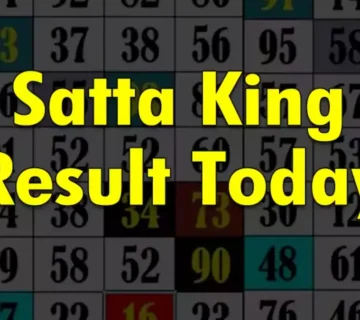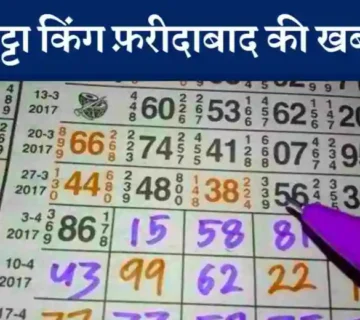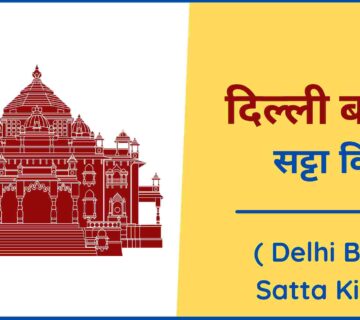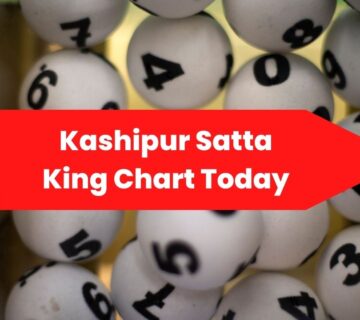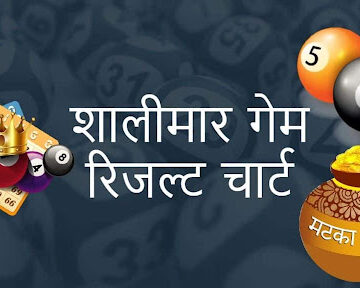In the labyrinth of urban gaming and clandestine betting, one name echoes with a peculiar resonance – the Satta game. This enigmatic world of speculative gambling has permeated the societal fabric of many Indian cities, and Ghaziabad stands as no exception. With its own unique nuances and intricacies, the Satta game has entrenched itself in the alleys and corners of Ghaziabad, offering both allure and peril to its participants. In this discourse, we delve deep into the phenomenon of the Satta Game Ghaziabad, exploring its dynamics, implications, and its unmistakable presence in Ghaziabad.
Understanding Satta: A Brief Primer
Before embarking on a journey into the realms of Ghaziabad’s Satta scene, it is imperative to comprehend the essence of the game itself. Satta, often dubbed as the ‘king’ of speculative games, is a form of gambling that originated in India during the pre-independence era. Initially centered around wagering on the opening and closing rates of cotton transmitted from the New York Cotton Exchange to the Bombay Cotton Exchange, Satta has undergone numerous transformations over the years, evolving into a sprawling network of speculative betting on various outcomes.
At its core, the Satta game operates on the premise of chance, with participants placing bets on a plethora of events, ranging from cricket matches and political elections to stock market fluctuations and even the weather. However, the most popular and enduring form of Satta revolves around betting on the randomly generated numbers, typically ranging from 00 to 99, where participants speculate on the outcome of these numbers through various permutations and combinations.
The Satta King Phenomenon
Within the realm of Satta, certain figures have attained an almost mythical status, none more so than the elusive ‘Satta King.’ This title, often accompanied by numerical connotations such as ‘Satta King 786,’ embodies the pinnacle of success and influence within the Satta community. The Satta King is revered for their purported ability to predict and manipulate the outcomes of the game, garnering immense respect and awe from both enthusiasts and participants.
In Ghaziabad, the reverence for the Satta King is palpable, with whispers of their legendary exploits circulating through the narrow streets and bustling markets. Whether it be the Satta King Faridabad or the enigmatic figure synonymous with Ghaziabad’s Satta game, these individuals wield considerable power and influence, dictating the ebb and flow of the clandestine world they inhabit.
Ghaziabad’s Tryst with Satta: Today and Beyond
For decades, Ghaziabad has been entrenched in the labyrinthine network of Satta, with its denizens actively participating in the speculative frenzy that defines the game. Each day brings forth a new chapter in Ghaziabad’s Satta saga, with individuals eagerly awaiting the results of the day’s draws and betting fervently on their chosen numbers.
“Satta game Ghaziabad today” resonates as a mantra among the city’s inhabitants, encapsulating the anticipation and excitement that permeate the air. From bustling marketplaces to secluded alleyways, the fervor of Satta grips Ghaziabad, transcending social barriers and economic divides.
Amidst the allure of quick riches and the adrenaline rush of placing bets, Ghaziabad grapples with the darker underbelly of the Satta game. Instances of addiction, financial ruin, and societal discord are stark reminders of the inherent risks associated with indulging in speculative gambling. Despite concerted efforts by authorities to curb the proliferation of Satta, its allure remains steadfast, entrenched in the cultural and economic fabric of Ghaziabad.
The Intersection of Tradition and Modernity
In the digital age, the landscape of Satta has undergone a paradigm shift, transcending geographical boundaries and embracing the virtual realm. Online platforms and mobile applications have proliferated, offering individuals the convenience of participating in Satta from the comfort of their homes. However, Ghaziabad’s Satta aficionados remain steadfast in their adherence to traditional modes of engagement, preferring the camaraderie and intimacy of physical betting dens over virtual anonymity.
“Satta King Gali” and “Delhi Satta King” resonate as familiar refrains among Ghaziabad’s Satta enthusiasts, symbolizing the interconnectedness of the city’s gambling circuit with its counterparts in neighboring regions. The convergence of regional nuances and communal identities serves as a testament to the enduring appeal of Satta in Ghaziabad and beyond.
Read Also: Shalimar Game Satta King: A Comprehensive Insight
Navigating the Ethical Quandaries
As we navigate the intricate web of Ghaziabad’s Satta scene, it becomes imperative to confront the ethical quandaries that underpin the game’s existence. While proponents argue for the autonomy of individuals to engage in speculative gambling as a form of entertainment and economic opportunity, detractors decry the societal ills perpetuated by Satta, ranging from exploitation and addiction to financial destitution and moral decay.
In this complex tapestry of perspectives and ideologies, Ghaziabad stands at a crossroads, grappling with the moral imperative to balance individual freedoms with societal well-being. As the debate rages on, one thing remains certain – the Satta game, with all its allure and peril, will continue to cast its shadow over the bustling streets and quiet alleyways of Ghaziabad, shaping the destinies of its inhabitants in ways both profound and enigmatic.



